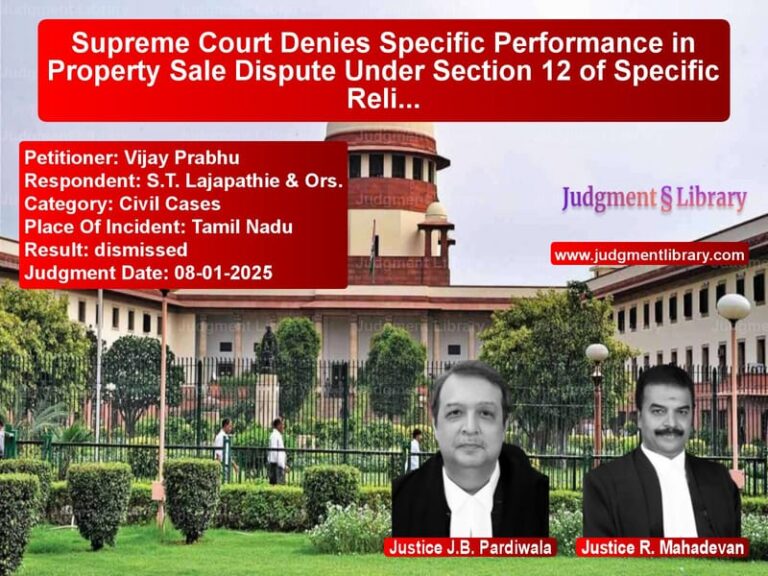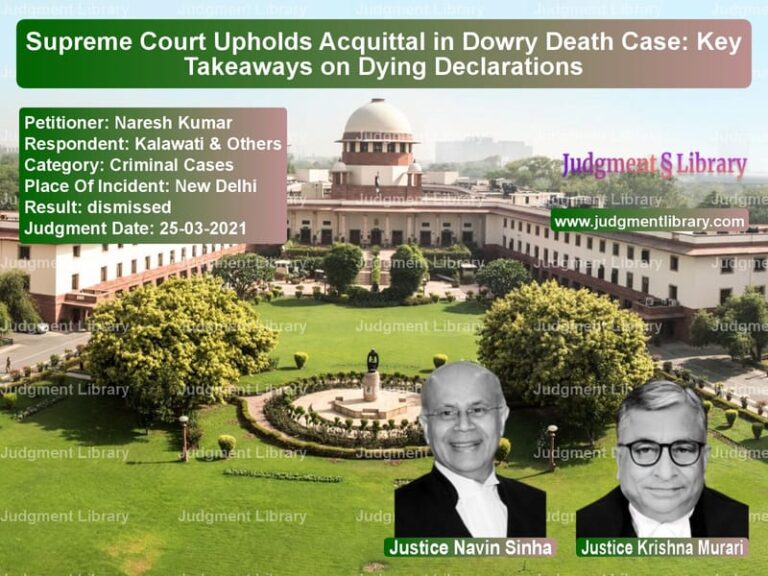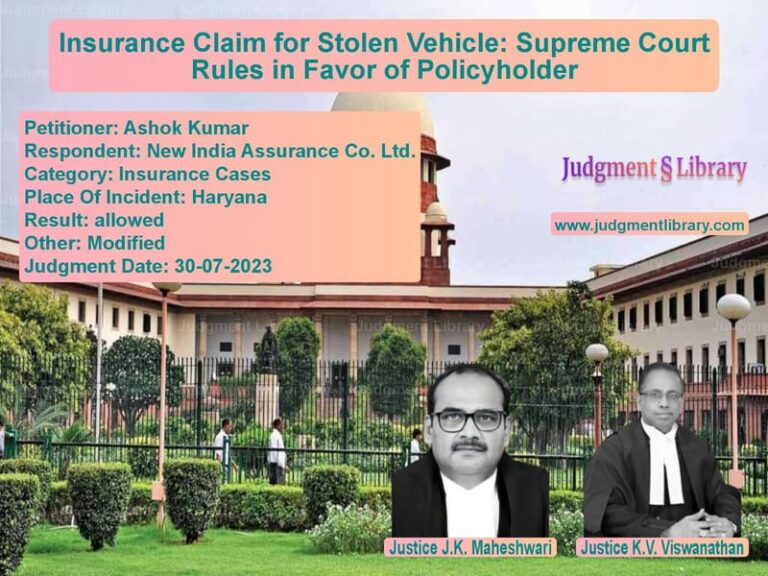Supreme Court Rejects Review Petition in Foreign Arbitration Award Case
The case of Arun Dev Upadhyaya v. Integrated Sales Service Ltd. & Anr. is a significant ruling by the Supreme Court regarding the enforcement of foreign arbitration awards. The Court dismissed the review petition challenging its earlier decision, affirming that a foreign award under the New York Convention can be enforced even against a non-signatory to the arbitration agreement. This ruling strengthens India’s pro-arbitration stance and clarifies the limits of judicial review in arbitration cases.
Background of the Case
The dispute arose from a Representation Agreement executed on September 18, 2000, between D.M.C. Management Consultants Limited (DMC) and Integrated Sales Service Ltd. (ISS). Under the agreement, ISS was to assist DMC in acquiring customers for a commission. The agreement included an arbitration clause, specifying that any disputes would be governed by the laws of Missouri, USA, and referred to arbitration under the American Arbitration Association (AAA).
Two amendments to the agreement were later executed. The first, in 2005, adjusted the commission structure and was signed by Arun Dev Upadhyaya (the review petitioner) in his capacity as Director of DMC. The second amendment, executed on January 1, 2008, nullified the first and made Delaware law applicable to the agreement.
Key Legal Issues
- Was the foreign arbitration award enforceable against a non-signatory (the review petitioner)?
- Did the Supreme Court’s previous ruling overlook key arguments raised by the review petitioner?
- Was the quantum of damages awarded in arbitration justifiable?
Petitioner’s (Arun Dev Upadhyaya’s) Arguments
The petitioner, represented by Senior Counsel Harish N. Salve, contended:
- That he was not a signatory to the Representation Agreement and could not be bound by its arbitration clause.
- That under Indian law, a foreign arbitration award should not be enforceable against a non-signatory, even if Delaware law allows it.
- That the New York Convention does not permit enforcement of foreign awards against non-signatories.
- That the award included damages based on speculative calculations, without documentary evidence.
Respondent’s (Integrated Sales Service Ltd.) Arguments
The respondents countered:
- The review petitioner had actively participated in the execution of the agreement and amendments.
- The Delaware legal principles allowed for piercing the corporate veil, making the review petitioner liable.
- The arbitration tribunal had jurisdiction to decide the dispute, including its authority over non-signatories.
- Under Section 46 of the Arbitration and Conciliation Act, 1996, a foreign award is binding between the parties as determined by the governing arbitration law.
Supreme Court’s Observations
On the Enforceability of Foreign Awards Against Non-Signatories
The Supreme Court ruled that the New York Convention and Indian law permit enforcement of foreign awards against non-signatories under specific circumstances. It noted:
“The canvas of Section 46 of the Act is wider than that of Section 35 of the Act and as such would apply to all the persons who are not even parties to the Arbitration Agreement.”
The Court observed that the review petitioner was deeply involved in the transaction and had signed amendments to the agreement, thereby making him liable.
On the Limited Scope of Review
The Court held that a review petition cannot be used as an appeal in disguise. Citing Satyanarayan Laxminarayan Hegde v. Millikarjun Bhavanappa Tirumale (1960), the Court stated:
“An error which has to be established by a long-drawn process of reasoning on points where there may conceivably be two opinions can hardly be said to be an error apparent on the face of the record.”
The Court reiterated that the power of review is limited to cases of error apparent on the face of the record and does not allow for reconsideration of the entire case.
On the Quantum of Damages
The Court rejected the argument that the damages awarded were speculative. It ruled:
“The quantification of damages was based on expert testimony and the arbitrator’s judgment. It cannot be reassessed in enforcement proceedings.”
It further held that under Section 48(1) of the Arbitration and Conciliation Act, the enforcement of a foreign award can only be refused if it is in contravention of Indian public policy, which was not the case here.
Final Judgment
The Supreme Court dismissed the review petition, reaffirming its earlier ruling. The judgment concluded:
- The foreign award was binding on the review petitioner.
- The petitioner’s objections had already been addressed in the previous ruling.
- The damages awarded were reasonable and enforceable.
Implications of the Judgment
This ruling has significant implications:
- Pro-Arbitration Stance: Reinforces India’s commitment to enforcing foreign arbitration awards.
- Expanded Liability for Non-Signatories: Sets a precedent that non-signatories can be held liable if they are sufficiently involved in the contract.
- Limited Scope of Review: Clarifies that review petitions cannot be used to reargue an entire case.
Conclusion
The Supreme Court’s decision in Arun Dev Upadhyaya v. Integrated Sales Service Ltd. upholds the principle that foreign arbitration awards must be respected, even when enforced against non-signatories. The ruling strengthens arbitration jurisprudence in India, ensuring that commercial agreements remain enforceable and that parties cannot evade liabilities through technical objections.
Petitioner Name: Arun Dev Upadhyaya.Respondent Name: Integrated Sales Service Ltd. & Anr..Judgment By: Justice B.R. Gavai, Justice Vikram Nath.Place Of Incident: India.Judgment Date: 04-07-2023.
Don’t miss out on the full details! Download the complete judgment in PDF format below and gain valuable insights instantly!
Download Judgment: arun-dev-upadhyaya-vs-integrated-sales-ser-supreme-court-of-india-judgment-dated-04-07-2023.pdf
Directly Download Judgment: Directly download this Judgment
See all petitions in Enforcement of Awards
See all petitions in International Arbitration
See all petitions in Judgment by B R Gavai
See all petitions in Judgment by Vikram Nath
See all petitions in dismissed
See all petitions in Quashed
See all petitions in supreme court of India judgments July 2023
See all petitions in 2023 judgments
See all posts in Arbitration and Alternate Dispute Resolution Category
See all allowed petitions in Arbitration and Alternate Dispute Resolution Category
See all Dismissed petitions in Arbitration and Alternate Dispute Resolution Category
See all partially allowed petitions in Arbitration and Alternate Dispute Resolution Category







